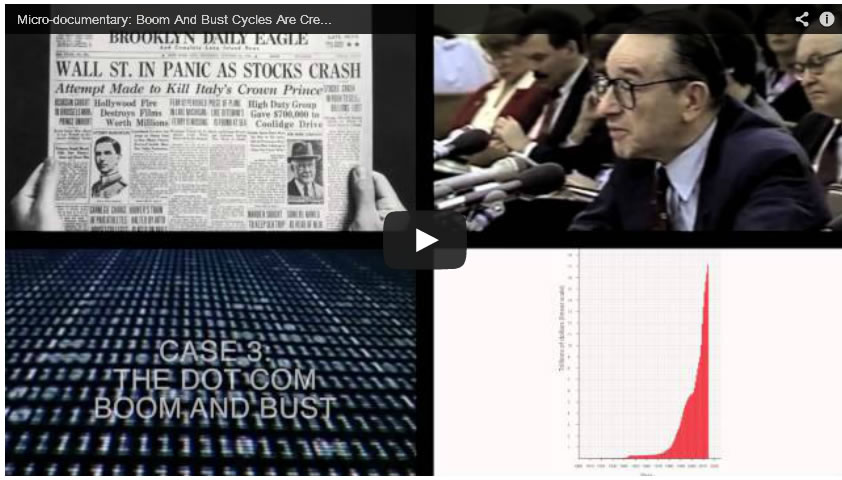The Truth About Economic Boom And Bust Cycles - Video
Economics / Economic Theory Oct 09, 2014 - 03:46 PM GMTBy: Submissions
 Claudio Grass writes: Most believe that expansionary monetary policy helps ease crises. Austrian School economists argue that central banks don't help in smoothing the amplitude of the cycles, but rather are the cause of cycles. In this microdocumentary video, we look back at four major busts in the last 100 years and explain how central banks created them. We also clarify why we believe the next bust is just around the corner. This video will not explain the mainstream view, but rather the view of the Austrian Business Cycle Theory (ABCT).
Claudio Grass writes: Most believe that expansionary monetary policy helps ease crises. Austrian School economists argue that central banks don't help in smoothing the amplitude of the cycles, but rather are the cause of cycles. In this microdocumentary video, we look back at four major busts in the last 100 years and explain how central banks created them. We also clarify why we believe the next bust is just around the corner. This video will not explain the mainstream view, but rather the view of the Austrian Business Cycle Theory (ABCT).
Austrian economists argue that business cycles are a direct cause of excessive credit flow into the market. This is facilitated by an intentionally low interest rate set by the government. This situation gives the false impression that money originally saved for investment has increased and the pool of investable funds is bigger. This creates an illusion and leads to misallocation of investments or 'malinvestments'.
By manipulating interest rates, governments create bubbles.
Austrian Business Cycle Theory argues that credit inflation is a distortion of what is actually available to support current production and consumption levels. That is why a correction is inevitable. Austrian economist Mises warned that the longer malinvestments continue, the more aggressive the correction becomes. A recession arrives when the economy readjusts as consumers come to reestablish their desired allocation of saving at prevailing interest rates. That is when consumers decide to save more and consume less. In such a market correction, everything goes down. It is a reversal of the inflationary pick up during the boom.
This microdocumentary video examines in detail 4 major booms in the last 100 years and explains how monetary policy and interest rate manipulation has led to the inevitable bust:
- The great depression of the 30ies
- The recession of the 90ies
- The dot com bubble
- The housing bubble
This video was created by Global Gold Switzerland. Global Gold offers exclusive research reports, available on request without any further obligation.
© 2014 Copyright Claudio Grass - All Rights Reserved Disclaimer: The above is a matter of opinion provided for general information purposes only and is not intended as investment advice. Information and analysis above are derived from sources and utilising methods believed to be reliable, but we cannot accept responsibility for any losses you may incur as a result of this analysis. Individuals should consult with their personal financial advisors.
© 2005-2022 http://www.MarketOracle.co.uk - The Market Oracle is a FREE Daily Financial Markets Analysis & Forecasting online publication.




